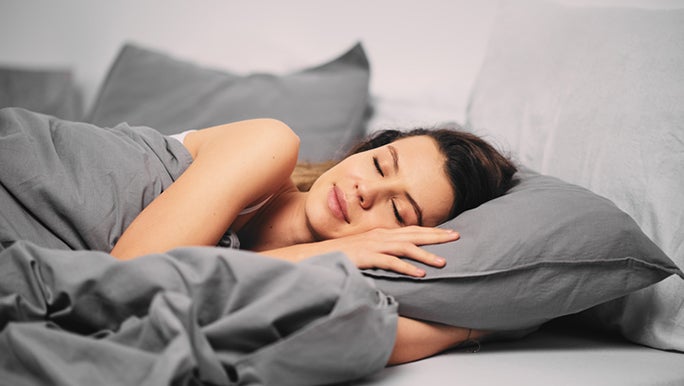Key Points
- REM sleep has an important role in dreaming, memory, emotional processing, and healthy brain development.
- Deep sleep helps us to release growth hormones and works to build and repair muscles, bones, and tissue. Deep sleep also promotes immune system functioning as well as having benefits for our thinking and learning.
- There are four sleep stages, and each plays a key role in our sleep cycle.
Sleep, snooze, slumber. Whatever you call it, it’s one of the most important things we do every day. But did you know that there are four different stages of sleep, each with unique benefits for our bodies and minds?
Two of these stages are known as REM and deep sleep. The main difference between REM and deep sleep is how our brains activate at each stage, which leads to a variety of benefits. While deep sleep helps repair and restore the body (as well as providing benefits for our learning and brain function), REM sleep is essential for memory consolidation and emotional processing.
We spoke to CEO of the Sleep Health Foundation and healthylife Advisory Board member Dr Moira Junge, who is a registered practising Health Psychologist, about the different stages of sleep and why they matter.
What’s the difference between REM sleep and deep sleep?
Let’s cut to the chase. Here’s the verdict on REM sleep vs deep sleep.
REM sleep stands for rapid eye movement sleep. It’s where you’re most likely to be dreaming and consolidating your memories. In this stage, your heart rate rises, your breathing becomes irregular, and your brain waves become more active.
Deep sleep is all about repair and restoration. Your body releases growth hormones to help repair muscles and tissues while improving cognitive function and memory.
Dr Moira explains that the point of difference between deep vs REM sleep is where they occur in the sleep period as well as the frequencies of the brain waves. Deep sleep is earlier in the sleep period and REM is mostly in the latter half of the sleep period.
“Deep sleep has delta waves with really slow, wide movements. It looks a bit like the Swiss mountains. REM has tiny straight waves going up and down, like little soldiers standing next to each other.”

No single stage of sleep is more important
Which is the most important stage of sleep?
In the same way every ingredient is essential to baking the perfect cake, no single sleep stage is more important. They all work together to ensure you have a well-rounded slumber.
“There’s no one sleep stage that’s better than another,” says Dr Moira. “They’re all important, whether they’re light or deep. The way to get more of both is to aim for more sleep overall”
There are four sleep stages in total. One is REM, while the remaining three are non-REM (NREM) and the non-REM stages are referred to as N1, N2 and N3. As we move through each stage, things in our bodies begin to change, like our muscle tone and brain waves.
- N1 is the lightest stage and accounts for about 5% of your total sleep. You breathe at a steady rhythm and may be able to hear the voices of people around you.
- N2 is deeper sleep. This is where your heart rate and body temperature will start to drop. Your brain waves change into a pattern known as ‘sleep spindles’, which maintains sleep and helps with memory consolidation. This stage takes up about 45% of sleep.
- N3 is the deepest non-REM sleep and takes up about 25% of your sleep. This stage is all about repair. Your body regrows tissue, builds bone and muscle and strengthens your immune system.
- REM sleep takes up the remaining 25%. Breathing is more irregular and your brain is super active. This stage is important for memory, learning and emotional processing.

We can’t control how long we spend in each sleep state
How much REM sleep and deep sleep do we need a night?
The amount of time we spend in each sleep stage varies from person to person, so there’s no definitive answer to this question. Dr Moira notes that if you’re getting enough sleep, your body is probably moving through the cycles on its own.
“No one has control over how long they move through each stage,” she explains. “It’s completely out of our hands. I recommend just aiming for good quality and quantity of sleep and letting the brain sort out the rest.”
How long do we spend in REM sleep each night?
We’ve established that we spend about 25% of our sleep time in REM. This means most healthy adults spend around 90 minutes in REM sleep, although this depends on the individual.
If you want to know how much REM sleep you need, it’s helpful to think of it in terms of the percentage of your overall sleep, rather than counting the minutes.
How long do we spend in deep sleep each night?
When it comes to deep sleep vs REM, this is one area where they’re similar. Like REM sleep, we spend around 20-25% of our night in N3, which is the deepest stage of deep sleep.
How do I know if I’m getting enough?
The best way to know if you’re getting enough REM and deep sleep is by ensuring you’re getting enough sleep in general. The exact amount will depend on your biology and lifestyle. However, studies show that work and driving are significantly impacted if you’ve had less than five hours.
Dr Moira also recommends taking sleep-tracking devices with a grain of salt and not relying on them as part of your health strategy.
“It's really unhelpful for people to use their gadgets to aim for a certain amount of sleep,” she says. “If you gamify sleep or think about it too much, your sleep may become disrupted.”
So, if you want to learn how to get more deep sleep, the best thing to do is work on getting more sleep overall. This might involve coming up with a relaxing bedtime routine and making sure the room is quiet, dark and cool, or taking magnesium for sleep if you have a deficiency.

Trusting your body rather than relying on sleep trackers may lead to a better sleep
Deep sleep vs REM sleep: the final verdict
REM and deep sleep are just two of the four crucial stages of our sleep cycle. While REM is all about dreams and memory, deep sleep is valuable for muscle repair and immune function.
If you have any concerns about your sleep quality, consider speaking to a healthcare professional. They’ll be able to assess your individual needs and devise a plan to get you on the right path.
Related:
Dr Moira Junge, a healthylife Advisory Board member, is a registered practising Health Psychologist with the added specialty of sleep. She has been in private practice for over 20 years and is the CEO of the Sleep Health Foundation and was a founding member of the Behavioural Management of Sleep Disorders Committee within the Australasian Sleep Association (ASA). Dr Moira was also Chair of the ASA Insomnia and Sleep Health Council (2008-2015) and is a full member of the Australian Psychological Society.
Reviewed by the healthylife Advisory Board March 2023.



